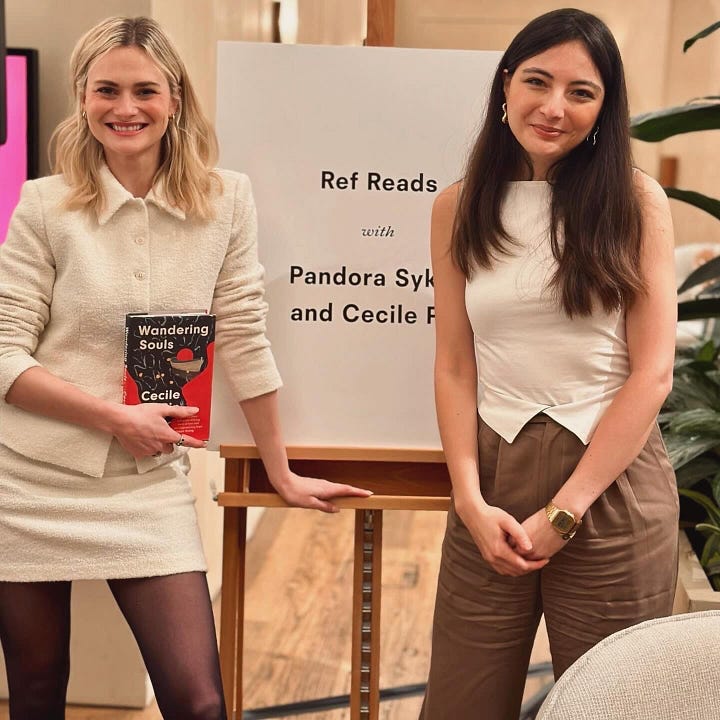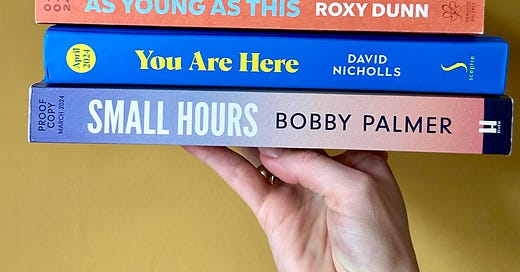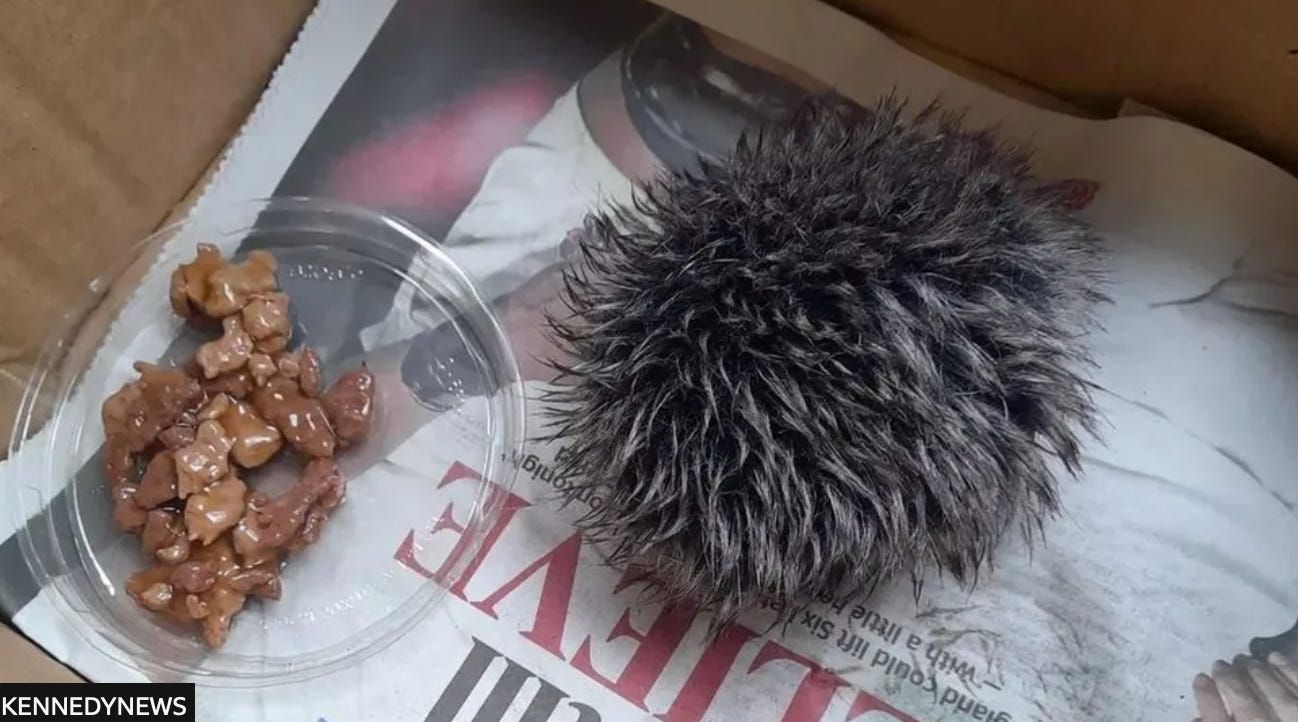Small Hours by Bobby Palmer - out now
As regular listeners of Book Chat will know*, my co-host Bobby is a big fan of animals and whimsy. (If there’s a book about a man in love with a seahorse, you can bet Bobby’s read it.) He likes it in the books he reads and he likes it in the books he writes.
I first met Bobby when I interviewed him for an erstwhile book club club I hosted, about his debut novel Isaac and the Egg, a tender, surreal book about a grieving young man, Isaac, and an anthropomorphic egg that he finds in a forest. I liked Bobby and his batty book so much I asked him to co-host Book Chat (which The Guardian recently gave a very nice review!) And now he has a new book and naturally, I think you should all read it.
Small Hours is about a family, all stuck in one way or another. Jack is trapped in a punishing job, his younger sister, Charlotte, is trapped at home with her parents, his father Gerry is trapped in his own brain - and his mother, Hazel has escaped. But where has she gone? When Jack comes home to try and find her, he is forced to confront the extent of his father’s dementia, and the forest that he ran away from. Oh and - of course! - there’s a talking fox.
“When that owl looked at Hazel - or, she supposed, at something else, something behind her, it couldn’t care less about her existence - she’d understood what he’d meant. And she felt, as she had been feeling or a while, a sense that what she’d been seeking with the punks and the crusties wasn’t the kid of freedom she truly craved. She wanted something more profound, something not counter to culture but beyond it, something beyond everything. Her life before had been defined by noise. Now she was away from it, she’d never felt more alive.”
What I love about Small Hours is that it looks at what happens when you eschew community. Jack’s parents are socially awkward (Gerry) and seeking a revolutionary sort of freedom (Hazel) and gradually turn their backs on socialisation, in favour of nature and each other. Jack, seeking the opposite, has immersed himself in the busyness of city life - but ended up just as isolated as his parents. His father only has his mother, Jack only has his job. But what happens when you take away the only thing that defines you? Who is Hazel without Gerry? Who is Gerry without his mind? Who is Jack without his job? How do you sustain yourself and those around you?
It’s the rewilding of a family, told with Bobby’s signature dollop of warmth and pathos. And did I mention there’s a talking fox?
*which has since migrated to Books+Bits - new ep next month!
As Young As This by Roxy Dunn - out Thursday
This book is such an easy sell: a 34-year-old woman on the cusp of a major life decision, tells her life story through ten men. It’s an elegant and pleasingly written piece of literary/commercial fiction (lit/com?) that reminds me of Anna Hope’s Expectation. The blurb declares it to be “achingly relatable”, which is an oft parroted promise not always met, but I think this debut delivers thanks to the clever narrative structure: even if you are not heterosexual, you are likely to find at least one story that speaks to your own dating experience - whether it be a one-night stand, an illicit affair, or a Great Love.
As Young As This is brilliant on contemporary womanhood and the desire to be loved, to belong. Oh the ways in which a young woman might contort herself for a man not worthy of her contortion!
“It’s after you finish with Patrick that you take pause, acknowledging that in your efforts to make it work with him, you’ve neglected your own friendships and interests. You start swimming in the local reservoir, go on a day-trip to Whitstable with Lillie and Ishani (where you once again try to enjoy the taste of oysters but get no further than indifference), call your old schoolfriends who you feel increasingly disconnected from as their lives branch off at ever growing distances to yours but who continue to care deeply about you, and vice versa.”
Dunn is a comedy performer - a graduate of the BBC Comedy Writers room, who has written for Radio 4 and acted in sell-out shows at the Edinburgh Fringe and the Soho Theatre - but I was pleased to find that the book is not ostentatiously funny, more lightly witty, and only when it fits the dialogue.
“Compliments belong to the wearer, not the owner.”
“Ooh, who said that?”
“I just did.”
“Very Wildean.”
Without giving anything away, the book is not the rom-com cliche it could be. The men in question are merely the scaffolding through which Margot can tell her life story. The book is about her, not them. And it’s insanely moreish, best devoured in a several long gulps.
You Are Here by David Nicholls - out 23rd April
David Nicholls’ sixth novel arrives just as the One Day energy ebbs; a clever marketing trick or a neat coincidence? Possibly both. It’s typical Nicholls: sweet, thinky, eloquent, a little old-fashioned (you won’t find raucous bonking in any of his books.) I would say that Nicholls’s books have grown up as he has grown up, and I think this is a rather nice thing.
You Are Here is inspired by a walk Nicholls took a few years ago from the west coat to the east coast of England and it is very walky, for want of a better word. I am very bad with long descriptions of nature/ the sublime, but I was always brought back by the charming characters and the gentle sweetness of the story. Marnie has gradually folded in on herself, aided by the isolation of Covid. Michael is mourning a break-up with his wife. When a bossy mutual friend invites (read: forces) them both to come on a walking tour, they both reluctantly accept.
“She knew perfectly well how to read a map but it was fun to see his enthusiasm, and she found herself stealing little glances as he talked about contour lines, the difference between footpath and bridleway, and how to estimate time with the joint of his thumb. It was all fantastically boring of course, or rather the subject was boring but the speaker was not.”
It’s also a rather lovely homage to the British countryside and evolving towns. Nicholls is always good at bringing social and cultural references into his work - it’s one of the best things about One Day.
“[Michael] thought of his own hometown… Everyone’s dad had worked [in the printing works]… and when the last scraps of production moved abroad, the whole town lost it purpose… shops and pubs closing, the town centre taking on an aggressive air, so that people were more inclined to stay indoors.”
Nicholls describes the book as “about company and solitude, the city and the country, a chamber-piece with mountains.” It’s a nourishing, restorative book, the equivalent of lying in a meadow and studying the blades of grass. If you lie in the meadow while reading You Are Here, you might actually reach nirvana.
BITS
I mentioned Marianna Spring’s podcast, Why Do You Hate Me, a few letters ago, when she interviewed the woman who received death threats after posting online that she believed that she was Madeleine McCann and episode 5 featuring The Trolled (former professional footballer and Sky pundit, Eni Aluko) and The Troll (a football fan identified only as James) is another must listen. Both interviews are fascinating: Eni in her resilience and eloquence about the misogynoir that forced her to flee the country in January and James in his honesty/ rigid beliefs about sport.
The first instalment of Ref Reads - my quarterly in-store book event for Reformation - kicked off last week at their flagship store in London! I chose Cecile Pin’s extremely moving piece of historical fiction, Wandering Souls, about a Vietnamese family who emigrate to London in the 1970s, which was longlisted for the Women’s Prize last year. If you haven’t yet read it, I hard recommend - although have your tissues at the ready. The next Ref Reads is happening in June - it’s a goodie! - and I’ll be sharing the link for tickets, mid-May.


I loved Anne Kadet’s piece on eating dog food for a week (her dog’s ‘high-end kibble’ sounded a lot like a cheaper version of her paleo diet, she decided) almost as much as I loved all the comments saying that it must be an April fool. It wasn’t.
Speaking of stories that should be April Fools, I have nothing but love for the woman who took a rescued baby hedgehog (a hoglet) into a wildlife charity, only to learn that it was a pom-pom off a bobble hat.
Still can’t get my head around this absolutely batty piece in The NYT - another non-fool which should be a fool - about a man who managed to exploit an archaic law in New York City to live rent-free in a hotel for 5 years. At one point, he somehow manages to transfer the hotel’s ownership into his name. How can so many loopholes exist in one city?? He’s now awaiting trial, so not sure he won in the end.
I recommend Scoop (out Friday) a dramatic re-telling of that Newsnight interview, which is less about Prince Andrew being grim (although Rufus Sewell is very good as PA, getting cross when his teddy bears aren’t lined up correctly) and more about Newsnight’s former Booking Editor Sam McAlister’s fight to secure interviews for the programme. (It’s based on McAlister’s memoir, and there’s a lot of interesting observations on the classism and cliques of the BBC and the palace.)
Billie Piper is brilliant as McAlister, while Emily Maitlis is played with coiffed, biro-wielding aplomb by Gillian Anderson. I got to watch an early screener at Netflix ahead of interviewing Anderson for Grazia a few weeks ago - and you can read that interview here, should you fancy!
And I finally watched Yorgos Lanthimos’s Poor Things having taken my sister’s advice to watch it in two sittings, to better absorb the absurdity. Wouldn’t say I loved it, per se, but was greatly impressed by the bizarre horniness of it, the filmography (with the black and white fish-eye and then the glorious technicolour) and Emma Stone’s performance as Bella Baxter - resurrected from the dead by Frankenstein-esque scientist, Godwin Baxter - which is definitely deserving of the Oscar.
I appreciated the backstories about child cruelty (God takes immoral risks as a scientist because of his own father, who experimented on him) and violence against women (which becomes part of born-again-Bella’s vengeance) which elevated it beyond gothic farce. May never get God’s gastric bubbles out of my head, nor the term, ‘furious jumping’. Iykyk.
Some dual-screening later and I also finally learned the definition of steampunk (a genre mash-up of sexy Victorian and techno-futurism, as seen in Poor Things.)

A couple of great profiles from The Times/ The Sunday Times stable of late: a breath-takingly honest and frequently shocking interview with Rebel Wilson on the pressure of being Famously Fat in Hollywood and losing her virginity aged 35 (will be ordering her memoir stat); and a surprisingly delightful, also very honest one with Gary Goldsmith.
Still shook that Rodin, creator of The Kiss (or so I thought), NEVER CARVED A SINGLE MARBLE! (Via the excellent @thegreatwomenartists.) Some of his work was said to have been carved by his wife, Camille Claudel, who was “plagued her entire career by critics who accused her of copying [Rodin], or being lesser than him.”
I answered a Q&A for Jane Ratcliffe’s lovely newsletter, Beyond, which is sans paywall, should you wish to read.
I recently learned the meaning of il dolce far niente, an Italian phrase meaning ‘the sweetness of doing nothing’ or ‘the sweetness of being idle’ which in turn reminded me of this quote from humorist Jerome K. Jerome, a nice note to end this letter on:
“I like idling when I ought not to be idling; not when it is the only thing I have to do”- Jerome K. Jerome.
As ever, drop by the Comments (rather than e-mail! I fail to keep on top of my inbox) if anything in today’s letter made your brain itch. I always love to hear from you!








Rodin’s wife! Love that we’re unearthing these truths lately 💛
Loved all the Rec’s!!! My fave part! Thank you